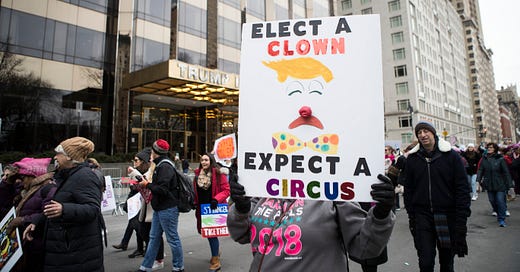The Private Spy Agency and the Clown Coup
January 6 riot wasn't the only Trumpist assault on the government, as revealed by a new report on a buffoonish attempt to entrap "the Deep State."
Ira L. Black - Corbis / Contributor
Trumpism is an authoritarian movement tempered by clownishness. Both parts of the definition are crucial but you can reach very different conclusions depending on which side of the equation you emphasize.
There’s a divide that spans the political spectrum on how worrisome Trumpism is. Many liberals and leftists, along with a smattering of conservatives, see the authoritarianism as a genuine and ongoing threat to American democracy, with the clownishness as mere window dressing. Conversely, a sizeable number of conservatives, as well as a faction of leftists and a few liberals, take comfort in the clownishness as evidence that the authoritarian threat was always minimal. Trump had and has neither personal capacity nor enough mobilized followers to overthrow democracy.
I fall into camp that takes Trump’s authoritarianism very seriously. If Trump was undermined by clownishness during his presidency, that doesn’t mean that in the future Trump, or more likely a demagogue who follows in Trump’s footsteps, couldn’t succeed. Many anti-democratic movements combine authoritarianism with clowning, for the obvious reason that clowning is a mode attractive to those who scorn the rule of law and the moral seriousness demanded by liberal citizenship. As T.W. Adorno argued a long ago, a clownish thumbing of the nose at respectability is a way authoritarians try to discredit democracy.
A New York Times report on attempts by Trump allies to spy on and entrap FBI agents and Trump’s former national security advisor H.R. McMaster. The efforts were led, amazingly, by military contractor Erik Prince, a brother Trump’s secretary of Education Betsy DeVos. So you had the family of one cabinet member running a dirty tricks campaign against another cabinet member.
Prince hired a sorry crew that included Richard Seddon, described by The New York Times as “a former undercover British spy” and James O’Keefe’s outfit Project Veritas (a notorious group of buffoons who make videos trying to entrap liberals and Democrats into saying and doing embarrassing things).
The operation was an outgrowth of Trump’s inability to effectively govern and get the national security bureaucracy to execute his wishes. As president Trump thought he was still running a family enterprise like the Trump Organization, where his word was law. As Trump said in 2018, “unelected deep-state operatives who defy the voters to push their own secret agendas” are “truly a threat to democracy itself.”
Either uninterested in or incapable of the actual grind of governing, Trump developed a preferred mode of using demagogic language to stir up his followers, both inside and outside the government. These riled-up supporters would then, to borrow a phrase from students of fascism, “work towards the Donald.” They would try to figure out how to execute his wishes. This was the root of both the January 6 riot and the earlier spying efforts by outside allies.
Given the involvement of Project Veritas, it’s not surprising that the efforts were more Austin Powers than James Bond, closer in spirit to the Coen Brothers’ farcical masterpiece Burn After Reading than the professional tradecraft chronicled by John le Carré.
The core plan was to use attractive female spies to entice HR McMaster and FBI agents into making embarrassing pronouncements. One worrisome detail of the plot against McMaster is that the schemers seem to have had access to the national security advisor’s schedule, which suggests an inside job.
The New York Times reports:
The scheme against Mr. McMaster, revealed in interviews and documents, was one of the most brazen operations of the campaign. It involved a plan to hire a woman armed with a hidden camera to capture Mr. McMaster making inappropriate remarks that his opponents could use as leverage to get him ousted as national security adviser.
Although several Project Veritas operatives were involved in the plot, it is unclear whether the group directed it. The group, which is a nonprofit, has a history of conducting sting operations on news organizations, Democratic politicians and advocacy groups
In spy fiction, this is called a “honeypot.” Honey was also laid out for FBI agents:
The plan was simple: Use undercover operatives to entrap F.B.I. employees and other government officials who could be publicly exposed as opposing Mr. Trump.
The group has previously assigned female operatives to secretly record and discredit male targets — sometimes making first contact with them on dating apps.
What are we to make of all this? On the one hand, it was patently absurd and, as far as we can tell, yielded no real world results. But it is definitely disturbing that a billionaire allied with the president thought he could spy on the law enforcement and national security officials, with a view towards enforcing ideological discipline.
The Trump era is that it was a stress test of American democracy. The stress test revealed many many areas of weakness. Since there are likely to be future demagogues, who might have a stronger dose of authoritarianism and slightly less clowning, it’s crucial to pay attention to even the plots that failed. They will be tried again and there is no certainty they will fail again.
If You Missed Yesterday’s Column
I had intended yesterday’s column to be sent to all subscribers, not just paying ones.But I mistakenly sent it out to only paying subscribers.
So many of you missed it. You can read it here: https://jeetheer.substack.com/p/david-horowitz-losing-friends-keeping
It’s about David Horowitz’s break over Trumpism with a friend of nearly 70 years. As you’ll see, it’s another facet of the authoritarianism and clownishness debate.
Share and Subscribe
If you like what you’ve read, please share:
Or subscribe:






Jeet, what you are describing about Trump is also a global phenomenon as we see more leaders gravitate to authoritarian rule. Reading your piece I was reminded of Henry VIII or Elizabeth who ruled by caveat, letting their wishes known to one or two people, allowing them to act, and if in the monarch's favour take credit, if not place blame to create an atmosphere of fear. It always seemed Trump's approach.